
Making Real Change
Jonesboro is in Northeast Arkansas, an area that is relatively poor and rural with about 70% of the students coming from low income families. The city of about 90,000 is surrounded by large corporate farms – the kind that farm thousands of acres of soybeans, rice and cotton, often by corporate "farmers" who live elsewhere. The Jonesboro public school system established a magnet school program in 2007, revitalizing all of their elementary schools. Melinda Smith's school chose Health, Wellness and Environmental Studies (HWES) as their school focus.
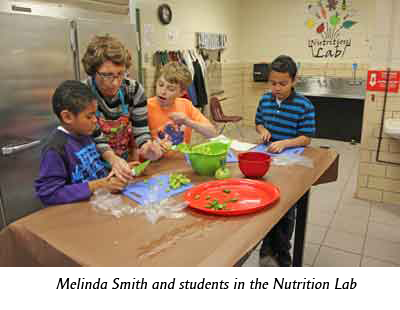 Starting from scratch, coordinator Melinda and a team of seven teachers and administrators researched and visited other schools and programs with the belief that they could and would create a teaching garden and kitchen program for their school, even given huge obstacles. A large percentage of the students’ parents receive food stamps, do not garden, and believe the fresh produce is beyond their finances.
Starting from scratch, coordinator Melinda and a team of seven teachers and administrators researched and visited other schools and programs with the belief that they could and would create a teaching garden and kitchen program for their school, even given huge obstacles. A large percentage of the students’ parents receive food stamps, do not garden, and believe the fresh produce is beyond their finances.
Many students had absolutely no familiarity at all with fresh vegetables and hadn’t ever eaten even a carrot. Starting with three Bermuda grass infested courtyards and an abandoned former cafeteria, they transformed the school and trained their entire staff.
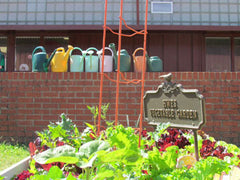 Now, just eight short years later, their HWES School has a tiny greenhouse, three outdoor classrooms with over 20 raised beds, an outdoor kitchen area and a classroom sized kitchen. Garden areas are divided into The Harvest Garden, Sensory Garden and Critter Garden (with 3 chickens: Minervia, Fred and Ethel, and rabbits Oreo and Shadow) and the abandoned kitchen is revitalized as the Nutrition Lab. All of the schools’ 1st thru 6th grade students have regularly scheduled time dedicated to garden learning as part of their day-to-day curriculum and the gifted and talented program students in grades 3 thru 6 are totally in charge of garden planning and garden maintenance – there is no other garden help on staff.
Now, just eight short years later, their HWES School has a tiny greenhouse, three outdoor classrooms with over 20 raised beds, an outdoor kitchen area and a classroom sized kitchen. Garden areas are divided into The Harvest Garden, Sensory Garden and Critter Garden (with 3 chickens: Minervia, Fred and Ethel, and rabbits Oreo and Shadow) and the abandoned kitchen is revitalized as the Nutrition Lab. All of the schools’ 1st thru 6th grade students have regularly scheduled time dedicated to garden learning as part of their day-to-day curriculum and the gifted and talented program students in grades 3 thru 6 are totally in charge of garden planning and garden maintenance – there is no other garden help on staff.
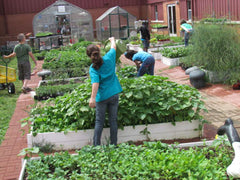 In their growing garden’s “classroom,” kids learn lessons that incorporate basic science, math, nutrition and the environment. They not only learn how to grow things, but produce the vegetables and greens used in the "teaching kitchen" where they prepare and cook their produce to make and enjoy healthy meals. The kids held their first plant sale last year with seedlings grown in their own little greenhouse – imagine a stand where kids sell seedlings instead of lemonade. They produce all the vegetables and greens that are used in the “teaching kitchen” lab.
In their growing garden’s “classroom,” kids learn lessons that incorporate basic science, math, nutrition and the environment. They not only learn how to grow things, but produce the vegetables and greens used in the "teaching kitchen" where they prepare and cook their produce to make and enjoy healthy meals. The kids held their first plant sale last year with seedlings grown in their own little greenhouse – imagine a stand where kids sell seedlings instead of lemonade. They produce all the vegetables and greens that are used in the “teaching kitchen” lab.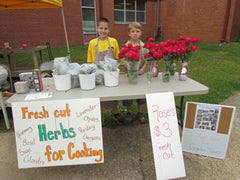 One of their biggest challenges was working with the parents of these students, who ask questions like “what’s wrong with pizza and tater tots for school lunch” and “why should kids learn how to grow their own food?” Even when confronted with “that’s impossible,” Coordinator Melinda and the group of interested fellow teachers are dedicated to teaching kids about health and wellness, understanding that the foods kids eat has a bearing on every aspect of their lives, including how they learn, how they grow and what they become. Melinda’s program is a potent game changer which illustrates the power and value of connecting kids and growing things, and shows the tangible and intangible rewards making that connection.
One of their biggest challenges was working with the parents of these students, who ask questions like “what’s wrong with pizza and tater tots for school lunch” and “why should kids learn how to grow their own food?” Even when confronted with “that’s impossible,” Coordinator Melinda and the group of interested fellow teachers are dedicated to teaching kids about health and wellness, understanding that the foods kids eat has a bearing on every aspect of their lives, including how they learn, how they grow and what they become. Melinda’s program is a potent game changer which illustrates the power and value of connecting kids and growing things, and shows the tangible and intangible rewards making that connection. The original magnet grant is history, and they’ve been operating the program now for several years by bootstrapping supplies and resources. One of the huge challenges Melinda deals with, besides frantic and persistent grant-writing to keep the garden going for the kids, is to move ahead and expand the program. We want to help Melinda’s program grow and succeed, and I want to invite our customers and friends to join with us to make it happen.
The original magnet grant is history, and they’ve been operating the program now for several years by bootstrapping supplies and resources. One of the huge challenges Melinda deals with, besides frantic and persistent grant-writing to keep the garden going for the kids, is to move ahead and expand the program. We want to help Melinda’s program grow and succeed, and I want to invite our customers and friends to join with us to make it happen.LET'S WORK TOGETHER TO HELP:
We want to help Melinda’s program continue to grow and succeed, and are inviting our customers to join with us to make that happen. I asked Melinda to make a Wish List of things she really needs but can’t afford for her program.
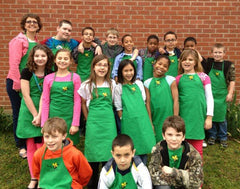 Melinda's Wish List:
Melinda's Wish List:WORX Aerocart Multifunction 2-Wheeled Yard Cart, Dolly, and Wheelbarrow $149.98
Gorilla Carts GOR866D Heavy-Duty Garden Poly Dump Cart with 2-In-1 Convertible Handle $129
5 Pack of 50 Cell SureRoots Deep Plug Trays for Starting Seeds and Cuttings $42.97
Look over the items on Melinda's Wish List, and send in a check with your donation to:
Finance Dept., Jonesboro Public Schools (Melinda's "Little Green Thumbs")
2506 Southwest Square
Jonesboro, AR 72401
And be sure to include your name and address or email, so the kids can write you back!
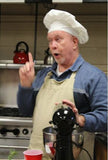 Finally, I first heard about this wonderful program from longtime friend Jim Long of Long Creek Herbs, an early and stalwart program supporter who drives six hours to teach hands-on classes to the kids in Jonesboro whenever he can. You can read more about his experiences teaching at the school and about Melinda and her kids on Jim’s marvelous blog at: http://jimlongsgarden.blogspot.com
Finally, I first heard about this wonderful program from longtime friend Jim Long of Long Creek Herbs, an early and stalwart program supporter who drives six hours to teach hands-on classes to the kids in Jonesboro whenever he can. You can read more about his experiences teaching at the school and about Melinda and her kids on Jim’s marvelous blog at: http://jimlongsgarden.blogspot.comAnd be sure to visit the HEWES School Garden Facebook page: http://www.facebook.com/HWESschoolgardens
Jonesboro is in Northeast Arkansas, an area that is relatively poor and rural with about 70% of the students coming from low income families. The city of about 90,000 is surrounded by large corporate farms – the kind that farm thousands of acres of soybeans, rice and cotton, often by corporate "farmers" who live elsewhere. The Jonesboro public school system established a magnet school program in 2007, revitalizing all of their elementary schools. Melinda Smith's school chose Health, Wellness and Environmental Studies (HWES) as their school focus.
 Starting from scratch, coordinator Melinda and a team of seven teachers and administrators researched and visited other schools and programs with the belief that they could and would create a teaching garden and kitchen program for their school, even given huge obstacles. A large percentage of the students’ parents receive food stamps, do not garden, and believe the fresh produce is beyond their finances.
Starting from scratch, coordinator Melinda and a team of seven teachers and administrators researched and visited other schools and programs with the belief that they could and would create a teaching garden and kitchen program for their school, even given huge obstacles. A large percentage of the students’ parents receive food stamps, do not garden, and believe the fresh produce is beyond their finances.
Many students had absolutely no familiarity at all with fresh vegetables and hadn’t ever eaten even a carrot. Starting with three Bermuda grass infested courtyards and an abandoned former cafeteria, they transformed the school and trained their entire staff.
 Now, just eight short years later, their HWES School has a tiny greenhouse, three outdoor classrooms with over 20 raised beds, an outdoor kitchen area and a classroom sized kitchen. Garden areas are divided into The Harvest Garden, Sensory Garden and Critter Garden (with 3 chickens: Minervia, Fred and Ethel, and rabbits Oreo and Shadow) and the abandoned kitchen is revitalized as the Nutrition Lab. All of the schools’ 1st thru 6th grade students have regularly scheduled time dedicated to garden learning as part of their day-to-day curriculum and the gifted and talented program students in grades 3 thru 6 are totally in charge of garden planning and garden maintenance – there is no other garden help on staff.
Now, just eight short years later, their HWES School has a tiny greenhouse, three outdoor classrooms with over 20 raised beds, an outdoor kitchen area and a classroom sized kitchen. Garden areas are divided into The Harvest Garden, Sensory Garden and Critter Garden (with 3 chickens: Minervia, Fred and Ethel, and rabbits Oreo and Shadow) and the abandoned kitchen is revitalized as the Nutrition Lab. All of the schools’ 1st thru 6th grade students have regularly scheduled time dedicated to garden learning as part of their day-to-day curriculum and the gifted and talented program students in grades 3 thru 6 are totally in charge of garden planning and garden maintenance – there is no other garden help on staff.
 In their growing garden’s “classroom,” kids learn lessons that incorporate basic science, math, nutrition and the environment. They not only learn how to grow things, but produce the vegetables and greens used in the "teaching kitchen" where they prepare and cook their produce to make and enjoy healthy meals. The kids held their first plant sale last year with seedlings grown in their own little greenhouse – imagine a stand where kids sell seedlings instead of lemonade. They produce all the vegetables and greens that are used in the “teaching kitchen” lab.
In their growing garden’s “classroom,” kids learn lessons that incorporate basic science, math, nutrition and the environment. They not only learn how to grow things, but produce the vegetables and greens used in the "teaching kitchen" where they prepare and cook their produce to make and enjoy healthy meals. The kids held their first plant sale last year with seedlings grown in their own little greenhouse – imagine a stand where kids sell seedlings instead of lemonade. They produce all the vegetables and greens that are used in the “teaching kitchen” lab. One of their biggest challenges was working with the parents of these students, who ask questions like “what’s wrong with pizza and tater tots for school lunch” and “why should kids learn how to grow their own food?” Even when confronted with “that’s impossible,” Coordinator Melinda and the group of interested fellow teachers are dedicated to teaching kids about health and wellness, understanding that the foods kids eat has a bearing on every aspect of their lives, including how they learn, how they grow and what they become. Melinda’s program is a potent game changer which illustrates the power and value of connecting kids and growing things, and shows the tangible and intangible rewards making that connection.
One of their biggest challenges was working with the parents of these students, who ask questions like “what’s wrong with pizza and tater tots for school lunch” and “why should kids learn how to grow their own food?” Even when confronted with “that’s impossible,” Coordinator Melinda and the group of interested fellow teachers are dedicated to teaching kids about health and wellness, understanding that the foods kids eat has a bearing on every aspect of their lives, including how they learn, how they grow and what they become. Melinda’s program is a potent game changer which illustrates the power and value of connecting kids and growing things, and shows the tangible and intangible rewards making that connection. The original magnet grant is history, and they’ve been operating the program now for several years by bootstrapping supplies and resources. One of the huge challenges Melinda deals with, besides frantic and persistent grant-writing to keep the garden going for the kids, is to move ahead and expand the program. We want to help Melinda’s program grow and succeed, and I want to invite our customers and friends to join with us to make it happen.
The original magnet grant is history, and they’ve been operating the program now for several years by bootstrapping supplies and resources. One of the huge challenges Melinda deals with, besides frantic and persistent grant-writing to keep the garden going for the kids, is to move ahead and expand the program. We want to help Melinda’s program grow and succeed, and I want to invite our customers and friends to join with us to make it happen.LET'S WORK TOGETHER TO HELP:
We want to help Melinda’s program continue to grow and succeed, and are inviting our customers to join with us to make that happen. I asked Melinda to make a Wish List of things she really needs but can’t afford for her program.
 Melinda's Wish List:
Melinda's Wish List:WORX Aerocart Multifunction 2-Wheeled Yard Cart, Dolly, and Wheelbarrow $149.98
Gorilla Carts GOR866D Heavy-Duty Garden Poly Dump Cart with 2-In-1 Convertible Handle $129
5 Pack of 50 Cell SureRoots Deep Plug Trays for Starting Seeds and Cuttings $42.97
Look over the items on Melinda's Wish List, and send in a check with your donation to:
Finance Dept., Jonesboro Public Schools (Melinda's "Little Green Thumbs")
2506 Southwest Square
Jonesboro, AR 72401
And be sure to include your name and address or email, so the kids can write you back!
 Finally, I first heard about this wonderful program from longtime friend Jim Long of Long Creek Herbs, an early and stalwart program supporter who drives six hours to teach hands-on classes to the kids in Jonesboro whenever he can. You can read more about his experiences teaching at the school and about Melinda and her kids on Jim’s marvelous blog at: http://jimlongsgarden.blogspot.com
Finally, I first heard about this wonderful program from longtime friend Jim Long of Long Creek Herbs, an early and stalwart program supporter who drives six hours to teach hands-on classes to the kids in Jonesboro whenever he can. You can read more about his experiences teaching at the school and about Melinda and her kids on Jim’s marvelous blog at: http://jimlongsgarden.blogspot.comAnd be sure to visit the HEWES School Garden Facebook page: http://www.facebook.com/HWESschoolgardens



